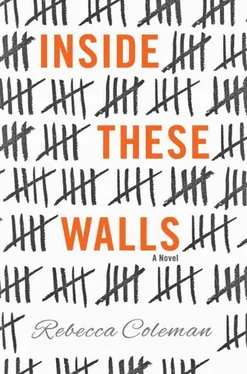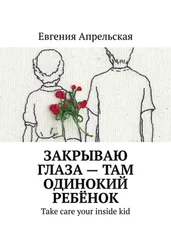* * *
Ricky Rowan hung himself in his cell sometime in late 1986. He didn’t even make it two full years in prison. My feelings about him were still cloudy then, hadn’t yet settled into what they would become, but mostly, when I got the letter informing me, I wanted to die, too.
I didn’t, though.
His cousin Dan came to visit me a couple of months later and read his suicide note to me through the telephone on the other side of the glass. My beloved Clara , it read, there is no life apart from you, no reason to do or be, and every quiet moment is torture imagining what might have been . He rambled on in that vein for a while, and then closed his letter with, What was sundered and undone shall be whole—the two made one. As Dan set down the letter he said, “I thought that last line was beautiful.”
“It’s from the movie The Dark Crystal ,” I told him. And that’s all it was, his entire letter a strung-together series of quotes cribbed from Madeleine L’Engle books, Bob Marley songs and fantasy movies. Really, Ricky , I thought dejectedly, how could you let your last words be so unoriginal?
There have been three times in prison when I felt I couldn’t go on. The first was the end of my pregnancy, when I lay on the green cot in the small clinic and screamed and screamed, chipping both of my canine teeth by biting too hard against the dowel they gave me to shut me up. Then there was Ricky, and finally came the day I learned of the death of my mother, seven years into my sentence. I imagined her lying on her side in her floral-papered room beneath the gaze of my stepfather and the home-care nurse from the hospice, laboring through her last breaths and yearning for me to hold her hand. I knew she must have, because I was her dear girl, and she and I had been very close. The knowledge was like drowning, and I could hardly breathe or see; I gripped the sides of the narrow desk in my cell and gasped for air like a fish at the bottom of a boat. With her gone, the full force of my decisions hit me like a concussive blast, and I could see the bleak gray slate of the rest of my life that I had traded for the hope that she would find some peace to live by. When I tore apart my bedsheet and threaded it through the vent holes high in the wall above my toilet, it felt less like a suicide than a mercy killing. But I lacked skill, and after they cut me down the nurse informed me, with derision, that I’d succeeded only in bruising my trachea.
I know I will need to confess to the confrontation in the chow hall. I don’t like to let these unreckoned sins build up for too long, because doing so makes me feel distracted and fragmented. When I was a young teenager, my mother created a secret signal meant to look like a person pulling upward on a string, to remind me not to slouch. To see her signal caused me to automatically straighten my spine, as if God Himself was pulling the string from heaven. After confession I feel the same way: straightened, whole, self-contained. Without it I feel as though I’m constantly reaching for parts of myself that are rolling away, drifting far too close to the version of Clara who, in her stupor of thought, failed to recognize the chaos unfolding around her.
While Janny mumbles her rosary in Spanish I lay a folded undershirt on the floor beside her and kneel on it, resting my elbows against the bed, my forehead against my folded hands that hold my own rosary. I think about what Father Soriano asked me to do, about praying for my youngest victim. By my definition, or by his? I muse. It’s a knottier problem than it might appear. I have prayed for Eun Hee Choi every night since the first one— along with her father Jung-ho and her mother Mimi—so the penance should be easy. Yet his phrasing nags at my conscience, making me wonder if God has a different individual in mind.
I mull over it for a long time, until my knees ache and the cold of the tile has seeped through the shirt on the floor. And then, in the last minutes before the guards call us to the bars for night count, I whisper a hasty, nervous decade of Hail Maries for the other one. It makes me feel a little sick, but I do it. And afterward I feel anything but absolved.
* * *
As I expected, the discipline hearing exonerates me. I’m slapped on the wrist with a few routine restrictions on phone calls and visitors, but none of that matters to me. While I waited for my turn I managed to catch a few minutes of a television segment about the Robbins shooting, craning my neck a bit to watch the screen perched on a table in the office across the hall. The screen flashed a photo of the daughter’s boyfriend, a sturdy, cocoa-skinned young man with close-cropped hair and a football jersey draping his bulky shoulders. For the first time I got a glimpse of Penelope Robbins herself, who looks very different from what I expected. I had imagined a gloomy, recalcitrant young woman—the type with midnight-black hair and fingernails and a permanent glower. But Penelope is a beauty—a less refined, less polished little Audrey Hepburn of a girl, her bones as light as a pencil sketch and disappearing into the cavernous orange jumpsuit of the county jail. Sitting beside her lawyer at some hearing, her thick chestnut hair pulled back in a ponytail at the base of her neck, she looks like an ingénue playing the cleaning lady. Her story intrigues me more than ever now, and as I catch snippets of voiceover theorizing that she hired a hit man against her own father, I wish for the first time in years that I owned a television.
After the discipline hearing I squeeze in a few hours of work, and during cell time afterward I write back to Emory Pugh. I thank him for the canteen money and tell him about the large vole Clementine caught and brought to me as a gift. I ask him about his job at the furniture factory, and I try to describe Starry Night to him. Maybe he’ll look it up.
My mail consists of a religious magazine and a letter from an unfamiliar name. The addresses are handwritten, but the letter is typed.
Dear Ms. Mattingly,
My name is Karen Shepard, and I am writing a book titled, An Artist Unraveled: The Life and Death of Ricky Rowan. I am hoping you will allow me to interview you, as your insights are invaluable to this project. This book is already under contract, and so it will be a certain opportunity to tell the public your story in your own words.
The synopsis of the book is this: “Few who knew Ricky Rowan in his youth could have imagined the infamy in his future. In October of 1984, a series of brutal murders, including a family of Korean immigrants and a beloved priest, stunned the city of San Jose. Rowan’s crime spree and dramatic capture—amongst his followers at a shabby squatter’s den crawling with stray cats—inspired the Steve Griffin-directed feature film The Cathouse Murders. Yet the full story has never been told. Through exclusive interviews and meticulous research, Shepard offers an insightful look into the life and psychology of this once-promising American artist whose life on the fringe ended in his unraveling.”
I look forward to the opportunity to speak with you. I assure you that your words will be fully respected and accurately conveyed, and I hope you will take this opportunity to set the record straight about any misconceptions.
Yours very truly, Karen Shepard
I drop the letter into the trash. Janny hears the sound and asks, “You get another letter from Mr. Emory?”
“No. It’s from another person who wants to interview me. This one’s writing a book about Ricky.”
Her nose wrinkles in distaste. “That guy’s got enough attention. Tell that writer he should interview me . I got stories.”
“It’s a lady, and yes, you do. Somebody ought to tell your story.”
Читать дальше









